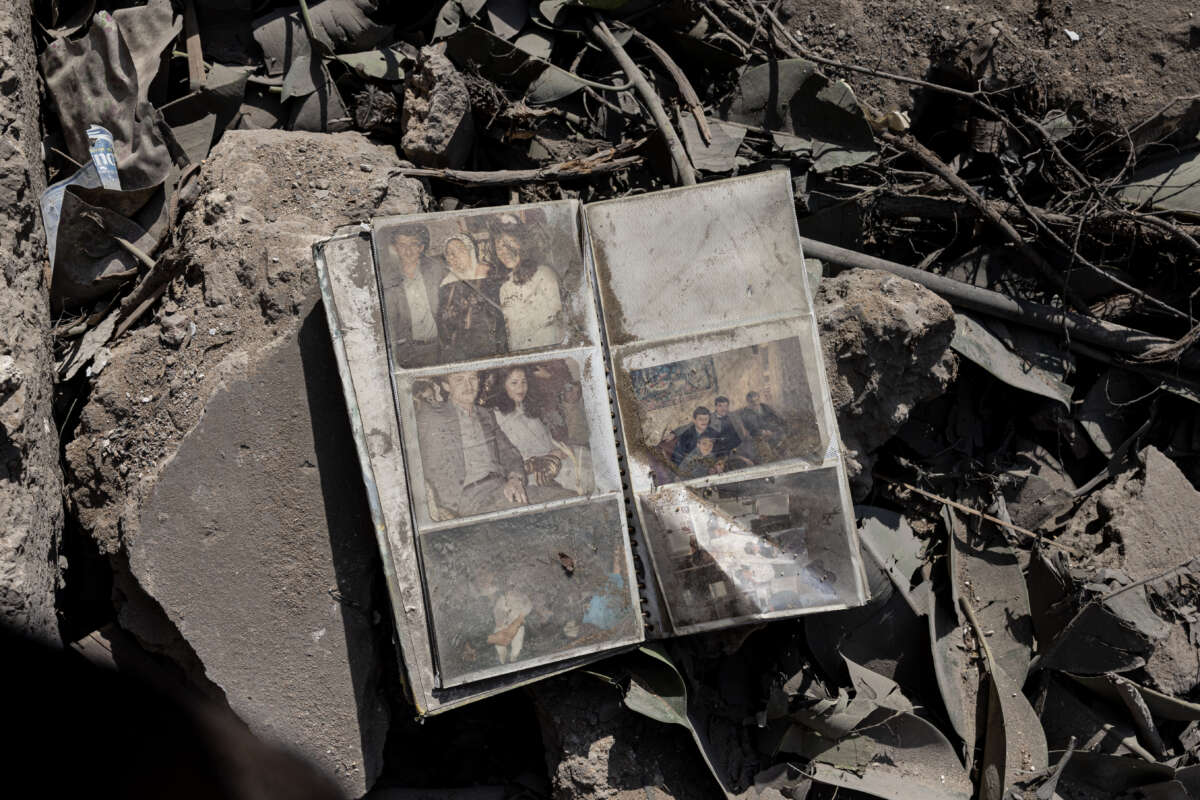Support justice-driven, accurate and transparent news — make a quick donation to Truthout today!
At least one U.S.-supplied bomb was used by Israel in a Thursday night airstrike that killed at least 22 people and wounded over 115 more in the Lebanese capital of Beirut, according to a Guardian analysis published on Friday.
The crisis, conflict, and arms division of Human Rights Watch and a former U.S. military explosives expert analyzed shrapnel from a bomb used by Israel in the strike on an apartment complex in the densely populated Basta neighborhood near central Beirut and concluded it came from a joint direct attack munition (JDAM) manufactured by Boeing.
“The bolt pattern, its position, and the shape of the remnant are consistent with the tail fin of a U.S.-made JDAM guidance kit for MK80-series air-dropped munitions,” HRW senior researcher Richard Weir told The Guardian.
MK80-series JDAMs are attached to so-called “dumb” bombs ranging from 500 to 2,000 pounds to convert them into GPS-guided “smart” munitions.
“The use of these weapons in densely populated areas, like this one, places civilians and civilian objects in the immediate area at grave risk of immediate and lasting harm,” Weir said.
In May, the Biden administration — which has approved tens of billions of dollars in armed aid to Israel, even as the key ally is on trial for genocide at the International Court of Justice — suspended transfers of 500- and 2,000-pound bombs over fears that the devastating munitions would be used in airstrikes on Rafah, the southern Gaza city where more than a million Palestinians had sought refuge.
By that time, Israel had already dropped hundreds of 2,000-pound bombs — which the U.S. military avoids using in civilian areas because they can destroy entire city blocks — on Gaza, including in an October 31 attack on the densely populated Jabalia refugee camp that killed more than 120 civilians.
The United Nations Human Rights Office said in June that Israel’s use of 2,000-pound bombs and other U.S.-supplied weapons likely violated international law by deliberately targeting civilians in disproportionate attacks. Israeli military commanders have also been criticized for using artificial intelligence-based target selection to approve bombings they know will cause high civilian casualties.
The Biden administration resumed shipments of 500-pound bombs to Israel in July, while keeping the temporary proscription on 2,000-pound munitions in place.
While Israeli forces and Hezbollah have been engaged in cross-border attacks since the armed wing of the Lebanon — based political and paramilitary group began firing rockets and other weapons at Israel in solidarity with Gaza after the Hamas-led October 7, 2023 attack, the intensity of Israel’s assault has increased dramatically since last month.
Since then, two waves of Israeli-engineered detonations targeting thousands of pagers and other communication devices killed dozens of people including Hezbollah members and civilians, two of them children. Later in September, Israeli forces unleashed an aerial bombing campaign in Lebanon, including the September 27 strike that assassinated Hezbollah political leader Hassan Nasrallah and other senior members of the group.
Expert analysis concluded that Israel used U.S.-supplied 2,000-pound bombs in the strike on a densely populated suburb of Beirut, which flattened several residential buildings.
Lebanon’s Ministry of Public Health says that more than 2,200 people — including at least 127 children — have been killed and over 10,000 others wounded by Israeli forces since last October. Hezbollah attacks have killed 28 civilians and 39 soldiers in Israel over the same period.
On Friday, United Nations Secretary-General António Guterres joined foreign ministers from countries including China, France, Italy, Indonesia, and Turkey, as well as human rights organizations around the world, in condemning Israeli attacks on U.N. personnel in southern Lebanon after two Indonesian U.N. peacekeepers were wounded by Israeli tank fire.
Speaking against the authoritarian crackdown
In the midst of a nationwide attack on civil liberties, Truthout urgently needs your help.
Journalism is a critical tool in the fight against Trump and his extremist agenda. The right wing knows this — that’s why they’ve taken over many legacy media publications.
But we won’t let truth be replaced by propaganda. As the Trump administration works to silence dissent, please support nonprofit independent journalism. Truthout is almost entirely funded by individual giving, so a one-time or monthly donation goes a long way. Click below to sustain our work.
